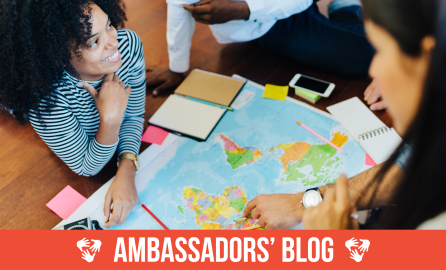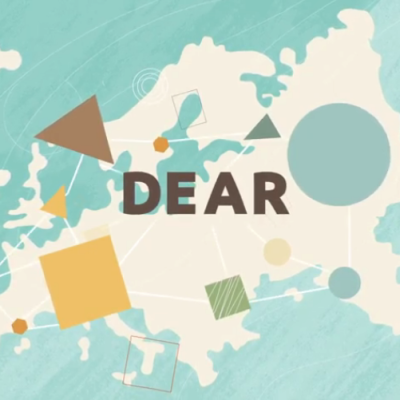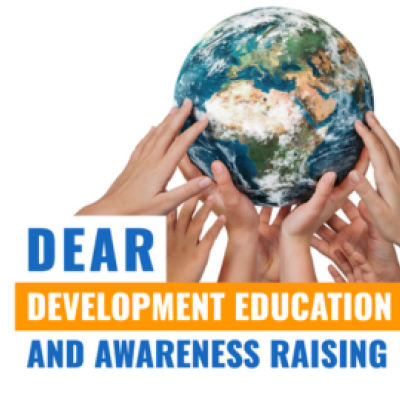Most EU sustainable development cooperation activities take place outside of the EU, and focus on education, environment, economics (and much more) in EU partner countries. But how much do people in Europe know about the EU’s cooperation work and the links that connect us all? Every day, our individual choices have the potential to send ripples across the globe. What we buy, eat, throw away, vote for, and post online can affect not only our own communities, environments, and economies, but also those across the globe.
For over 50 years, the EU Development Education and Awareness Raising (DEAR) Programme has been highlighting these global links in both classrooms and on the streets of Europe. Among all, the Directorate-General for International Partnerships’ (DG INTPA) programmes, it is the only one to focus on and support people, organisations and local governments in Europe, encouraging international partnerships and global awareness from within.
In the words of the President of the European Commission, Ursula von der Leyen: “Globalisation can be a great opportunity. It opens doors, connects people, and builds bridges. But we must ensure it doesn't deepen inequalities or threaten the values we cherish.” DEAR project activities help young people in Europe in particular face our rapidly changing world and act for global justice. Let’s take a look at some of these initiatives.
Transforming education for global citizenship
The EU DEAR Programme has been helping change the way people teach and learn - both in and outside of the classroom. Global Citizenship Education (GCE) - a cornerstone of DEAR - explores the interconnections among global issues: between climate change and gender issues; global production chains and inequalities; migration and environmental degradation. Through campaigns, public debates and schools, DEAR projects encourage people in Europe to understand how their actions affect the rest of the world. They research the relevant policies, their impact, citizens’ attitudes, practical realities and much more. DEAR campaigns are thus built on facts and critical understanding, rather than pure ideology and emotions.
CULPEER: Culture for Peer Learning connected students and artists in Europe with their peers in the Global South. They shared experiences of climate change, poverty and causes of conflict. In Germany, the UNESCO Commission and the Ministry of Education, took on the methodology. Around 140 high schools across Europe have since integrated the “students teach students” approach.
The current DEAR project It’s Global Education Time! develops didactic materials to help teachers incorporate global challenges, such as climate injustice, into their lessons. With their students, they explore root causes, get curious and creative, learn to think critically and act responsibly. DEAR toolkits and trainings help turn complex issues into bite-sized chunks, to enable active citizens to find creative solutions to existing challenges, imagine sustainable futures and act for positive change - locally and/or globally.
Changing narratives to counter polarisation
With the rise of digital and physical echo chambers, societies across the globe are polarising. Stereotypes are one means to simplify complexities, but can lead to discrimination and other types of harm to citizens and people seeking a safe home. Working with border towns in 11 European countries, Snapshots from the Border humanised the narrative and countered disinformation around migration. It shared personal and human stories of migration and active citizenship and accurate data to counter the trend to overestimate the number of migrants in one’s country.
Tackle addresses migrant and refugee rights by amplifying their voices. Listen to Abu Christian from Nigeria, whose advocacy as president of the foreign committee in Padua combats racism and bureaucratic obstacles in Italy. “To approach people who do not believe that racism exists, […] to convince them, you need to show them the facts,” Abu Christian says when describing his work to connect the local administration with migrants.
Local action for social justice and Sustainable Development Goals
From combating racism to enhancing global social justice, DEAR projects campaign for policies that foster sustainable development at local, national, and European levels. Thanks to Recognise & Change, the city of Turin officially declared anti-racism as a “common good.” Young educators in the Italian city worked with 11 to 19 year olds to drive the campaign and combat discrimination and violence against migrants and women.
In Finland, Frame-Voice-Report inspired new legislation that protects the children of victims of human trafficking. Thanks to the powerful testimony of one such victim, Itohan, and the efforts of volunteers, journalists, and relevant Finnish ministry staff, the government also appointed an Anti-Trafficking Coordinator.
Today Connecting the Dots is part of a global civil society campaign to counter the decrease in aid and international cooperation. It was part of the June 2025 UN conference on Financing for Development and continues to call for more investment in international solidarity. This project focuses on 15 to 30 year olds across Europe and supports them in taking action for an “Era of Justice.”
Promoting sustainable production and ethical consumption
Every purchase we make has a global footprint. Since the 1970s, EU DEAR projects have been raising awareness about that footprint, promoting ethical global supply chains, sustainable consumption and more. Thanks to the advocacy of Fish Forward, two major UK supermarket chains committed to end illegal fishing and respect human rights in their seafood supply chains. One of their trade managers highlighted the importance of “ensuring (that) all workers are operating within a safe and ethical environment.”
Fashioning a Just Transition lobbies the world of fashion as well as decision-makers for low-carbon, sustainable, and just practices in the global fashion industry. This past May, it brought Belgian retail and garment workers to meet their peers in Cambodia. They visited the factories that produce the clothes they sell, discussed workers’ rights, and reviewed the project’s Clean Clothes manifesto.
The civil society organisations and local authorities that drive DEAR activities demonstrate how local actions in Europe can have a global impact - in both empowering but, sometimes, potentially harmful ways. Through education, narrative transformation, advocacy, active citizenship and more, they empower communities to shape more sustainable futures at home and abroad.
Concluding thoughts
Programmes such as DEAR have the potential to reduce polarisation in society. “Bridging the internal and external partnership aspects,” the DEAR Programme focuses on people in the EU and their potential to learn more about the world, its realities and interconnections. By encouraging people in Europe to question ourselves and our individual and collective impact on the globe, we help develop a critical understanding and promote citizen active participation.
Programmes that bring together people in Europe and abroad to work together on equal footing are essential to empower communities across continents and oceans. They increase mutual respect and trust, the foundations for true and deep communication. This solid ground, in turn, helps amplify their own and shared stories, increasing the pride and power of communities worldwide.
Further information
To find out what DEAR is doing in your country of interest, explore the DEAR project map and check out the DEAR Calendar of Global Citizenship Education opportunities. See what the current 16 EU DEAR projects are doing across Europe to advocate for global sustainable development.







Log in with your EU Login account to post or comment on the platform.